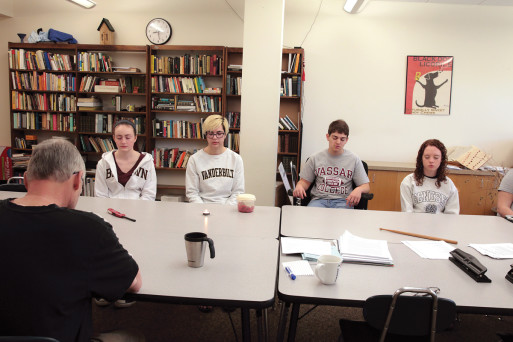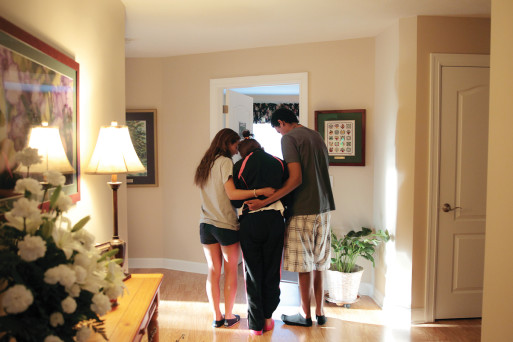
Credit: mindful.org
In 2002, Bob Kane created an award-winning hospice volunteer program for high school students at Rochester, New York’s Norman Howard School. He then moved on to The Harley School in Rochester, where he created a class for high school seniors called “Hospice,” which he taught for ten years. It’s a class with a drastically different aim than that of most high school electives: Students who enroll in the class are signing up to embark on a journey in which they explore their own relationship with death and learn how to care for people who are dying. The class inevitably ends up being a series of hard-hitting lessons about compassion. As Bob Kane says, “The course calls to them because it’s real and authentic. It’s extreme care-giving.”
Carolyn Rumrill, 18, says of the class, “At this stage, we’re expected to figure out our lives— where we’ll go to school next year. You need to do well in extracurricular and academics, so it’s really self-centered right now. This course moves you away from that. It’s not all about you. There are many aspects to life, so don’t freak out about every little thing. I also feel like I’ve become more attuned to listening instead of speaking.”
Kane taught his hospice course from 2002 until last spring. Now he’s planning on moving to Ireland with his wife while another teacher continues his legacy.
During his years of teaching hospice, Kane began the course each September by lighting a candle on a table in front of the class and then asking a student to come up and blow the candle out. “Once the breath is gone, that’s it,” he would tell his students. This would launch a conversation about the fragility of life.
The first thing students enrolled in the hospice class are asked to do is take a “death inventory,” processing and reflecting on their personal experiences with loss and discussing what drew them to the class. As they open up and candidly share personal stories, the students begin to create a bond — a foundation for the work they will do throughout the rest of the semester. Kane always reminds them that they also have to learn to take care of each other throughout their hospice journey.

Credit: mindful.org
The next step is to go through hands-on hospice care training. Students learn how to provide physical care for people who are dying, such as repositioning a resident in bed to prevent bedsores, changing the sheets of a bedridden resident, sponge-bathing, serving food, offering hydration and applying lotion to protect fragile skin. Once they are trained, the students start their visits to one of the four two-bed hospice houses that have signed up for the program. Under New York state law, two-bed hospice homes are allowed to operate as homes instead of health-care facilities. Once the students begin their shifts, the classes at school become a place to process their experiences as hospice volunteers.
For his feature length documentary “Beginning With The End,” Emmy Award-winning documentary filmmaker David Marshall followed Bob Kane’s hospice classes for two years. Marshall asks the question: Can empathy be taught? In answer, Bob Kane says, “It needs to be naturally woven in, and from what I see, the only way it’s stimulated and nurtured is through touch and contact — when you’re in a vulnerable position, but you’re willing to open up. When you’re fearful, you step forward and hope the other person will reciprocate. When you start caring for people who are ill, you understand what empathy is. I think that death, the dying process, is something that is essential to teach and nurture empathy because we all have it in common.”
Not many 18 and 19 year olds have the opportunity to look at their young lives through the lens of a hospice volunteer. That lens can be of great benefit, especially in pivotal transitional moments in life — like, say, one’s imminent graduation from high school. It has the power to render the important things such as connection, compassion and contribution in sharp focus. Kane’s hospice course offers nothing short of a major shift in perspective at a critical moment of transition in students’ lives.
Watch the trailer for the film “Beginning With the End” below.

 A High School Class Called “Hospice”
A High School Class Called “Hospice”



 Composting Bodies Is Now Legal in a Dozen States
Composting Bodies Is Now Legal in a Dozen States
 “Hand to Earth” by Andy Goldsworthy
“Hand to Earth” by Andy Goldsworthy














